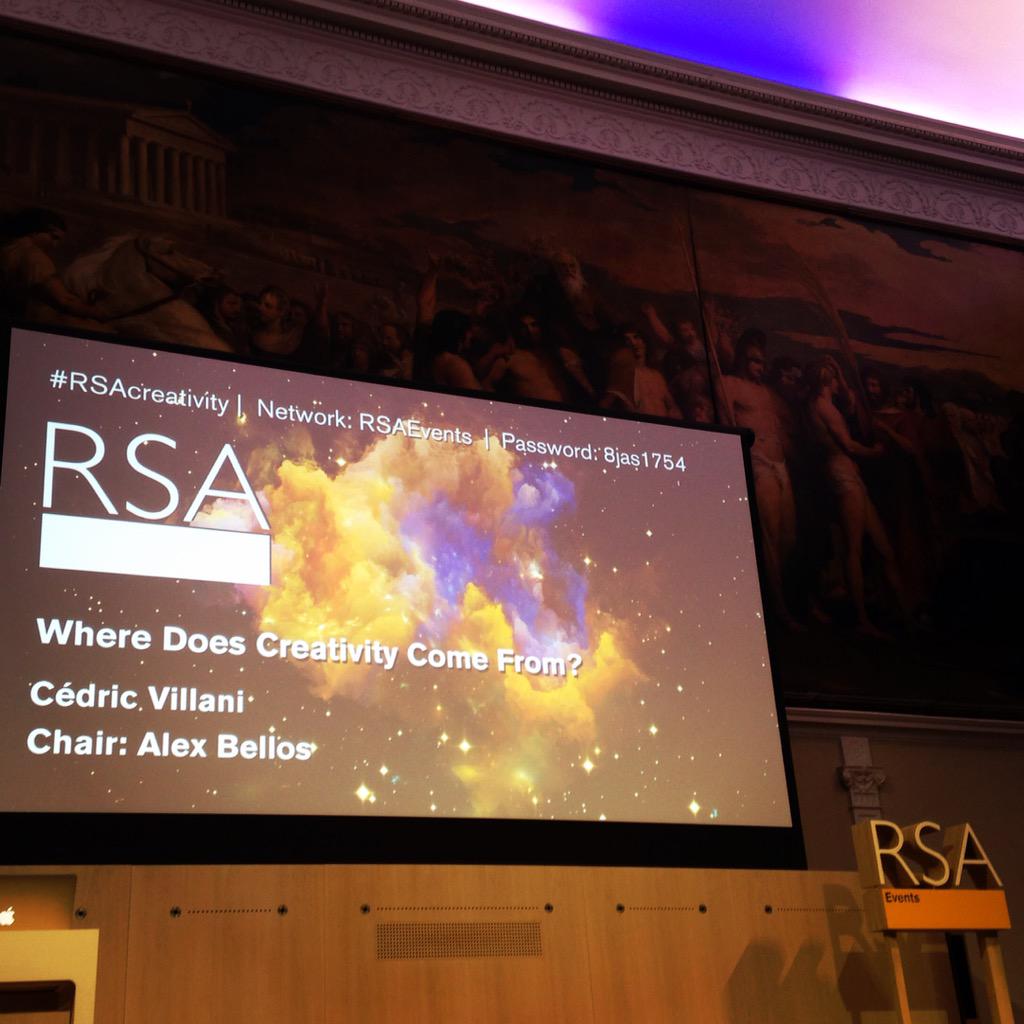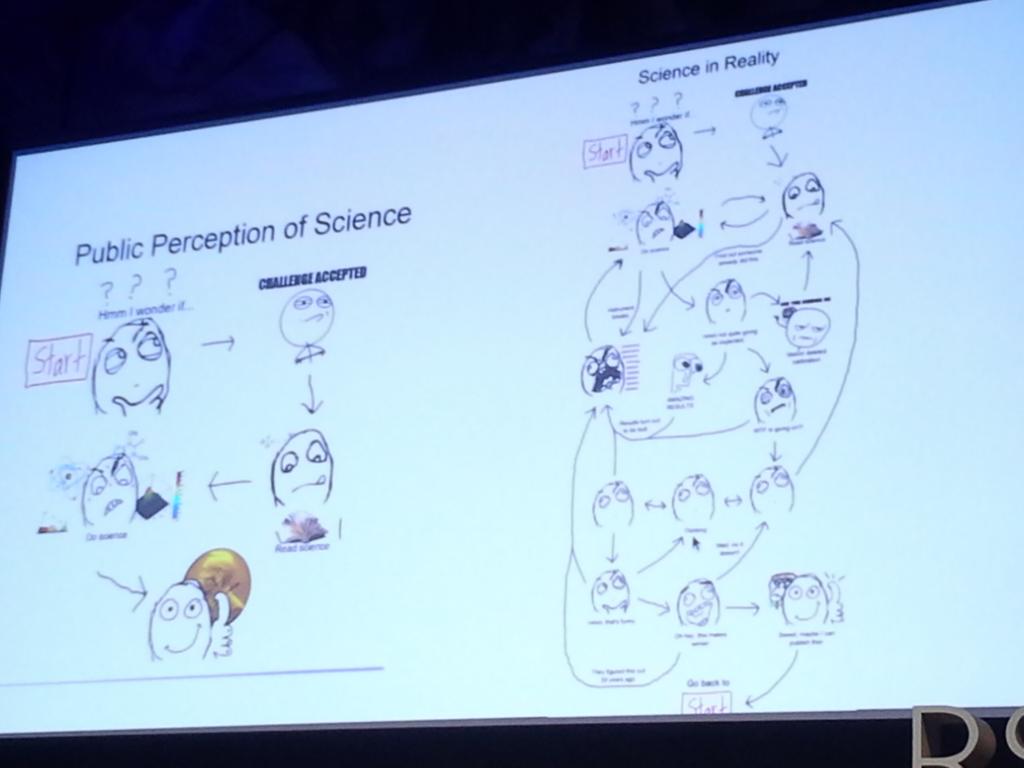 Marika@marikamoriyama
Marika@marikamoriyama Happening now! Lunchtime inspiration - creative pioneers on creativity #RSACreativity
This is my summary of the event which I watched via the video link this Tuesday. I have used various people's tweets on many of the points so my thanks for them for their succinct points. At the foot of this page are links to other posts on RSA, TED, other lectures, conferences & others blog posts.
The Executive Summary of what Cédric said about creativity is it needs 7 key ingredients
What follows are the ideas he wrapped around those 7 ingredients .....
- some features of maths and mathematicians;
- examples of maths & mathematicians connections with real world problems;
- 7 key ingredients for the birth of an idea - in a bit more detail
- science isn't a linear process - its messy
- thoughts from the Q&A
Some features of maths & mathematicians
Cédric started off by mentioning a 2009 @WSJ article/survey in which the job of mathematician was ranked as the best job in the USA. He then went on to draw about a no. of features about maths and being a mathematician
a) how maths plays such a big role in so much of our technology
b) how maths is 90% failure
- some features of maths and mathematicians;
- examples of maths & mathematicians connections with real world problems;
- 7 key ingredients for the birth of an idea - in a bit more detail
- science isn't a linear process - its messy
- thoughts from the Q&A
Some features of maths & mathematicians
Cédric started off by mentioning a 2009 @WSJ article/survey in which the job of mathematician was ranked as the best job in the USA. He then went on to draw about a no. of features about maths and being a mathematician
a) how maths plays such a big role in so much of our technology
b) how maths is 90% failure
c) how maths is about working on ideas and assembling them in the right way to create new mathematics to solve problems
d) how those ideas - past and present - coexist in the equations used to capture them
e) how maths is abstract but its ideas make connections to things in the real world
f) how maths is collaborative
Rose Kue @rosekue

"#Mathematics is a massively collaborative process" -- @Cedric_Villani #rsacreativity #AlanTuring #compsci

"#Mathematics is a massively collaborative process" -- @Cedric_Villani #rsacreativity #AlanTuring #compsci
He then went through a number of examples of how scientists/mathematicians had impacted the world with their ideas - these included
1) the idea of germs and so surgeons washing their hands before surgery
2) Cédric mentioned Alan Turin and the effect his maths had on the start of modern computing and how without his maths D Day couldn't have happened as early as 1944
3) how previous maths solutions from history can can be used to create unexpected solutions to current problems
- Cédric also talked about some of his experiences and how ideas can strike at any time - and are often products of the unconscious mind making connections
- and how mistakes can also lead to ideas
7 key ingredients for the birth of an idea - from Cédric's experience
1) Documentation
.... as documentation allows us to know what was done in the past
3) Environment - Is it favourable to the birth of ideas? - cities often are
4) Communication - to pursue a project you need people from different disciplines who an communicate well. Cédric also mentioned Gowers's weblog as an example of some experimentation in crowdsourcing solutions in mathematics
5) Constraints
4) Communication - to pursue a project you need people from different disciplines who an communicate well. Cédric also mentioned Gowers's weblog as an example of some experimentation in crowdsourcing solutions in mathematics
5) Constraints
... as they can force us to work beyond existing ways and lead us to new solutions
6) Meticulous systematic work - which eliminates the paths that don't lead to solutions
7) Luck and tenacity - being insistent helps the possibility of luck
Science isn't a linear process - its messy
- on the left of the picture below in Kathyrn's tweet below is the public perception of how science works - a nice ordered process - accept challenge - theory - experiment - conclusion
- but on the right of the picture is how it actually is - accept challenge - do science - equipment breaks - amazing result - turns out to be crap - hold on this works - no it doesn't - oh now I understand - maybe I can figure it out - what about this result from 50 years ago - wait a minute .... and so on
 Kathryn McMann@KathrynMcMann
Kathryn McMann@KathrynMcMannThe public perception of science versus the reality of science. #RSACreativity
He also mentioned that ideas are for sharing
Thoughts from the Q&A
Partnering
- he rarely does with those from his own institution - and those he has partnered with are often met through random associations and meetings
- with his experience of partnerships they go through the whole problem together rather than dividing it up
- and he doesn't tend to reconnect with his partners once their work is finished
Problem solving & idea generations
- at some point you need an abstract image of the real world - the ah ha's happen at that level- analogies sometime work as a way thinking about a situation
- sometimes ideas can be like a lightening strike
- in terms of what sort of circumstances/environments can trigger thoughts he can see no clear correlation or pattern from his experience
- models are fine but often when there is a crisis they are often proved to not work - Cédric cited here the recent problems with financial/economic models and their apparent reliance on cycles of fluctuations and the supposed (but illusionary?) independence of actors in the financial markets - and quoted the famous conclusion "The odel is perfect - its the real world that makes mistakes"
and finally ...
other posts on RSA, TED, other lectures, conferences, others blog posts
2015
how to innovate & survive - by @markf212 (Mark Payne)
18 top tips and thoughts about using #social media to enable #community source = an article by Anatoliy Gruzd PhD & Caroline Haythornthwaite PhD
thinking straight in the age of information overload - by @danlevitin
how to become a soulful organisation - by @fred_laloux
2014
thoughts & headlines from a conference on social media and images
Data Protection & Privacy - 8 issues from an International Conference
escape your social horizon limit & understand more - source = a blog post summarising the work of Jeffrey A. Smith, Miller McPherson & Lynn Smith-Lovin
OECD - challenges for the next 50 years - in an OECD report
Want to help somebody - shut up and listen - by ermesto sirolli
social media & death - 10 things you may not have thought about - #DORS conference
persuasion and power in the modern world and the rise of soft power - UK House of Lords
2013
UK Government Policy Blunders & their common causes - by Anthony King & Ivor Crewe
the development of the U2 spyplane - source = CIA historians Gregory Pedlow & Donald Welzenbach
Guide to Comments (esp. #YouTube) for creators - by @vihartvihart
considering culture and business process improvement - source = an article by Schmiedel, Theresa, vom Brocke, Jan, & Recker
ideas for your organisation from the 2013 99U conference
ideas that may help you attract older volunteers - source = a paper by Brayley, Nadine, Obst, Patricia L., White, Katherine M., Lewis, Ioni M.,Warburton, Jeni, & Spencer, Nancy
physical factors which help people get better quicker - source = a paper by Salonen, Heidi & Morawska, Lidia
a new approach to school and education - by Geetha Narayanan
principles for software to encourage participation - by Gerhard Fischer
guiding principles on designing construction kits - by Mitchel Resnick & Brian Silverman
how to identify the #culture of an organisation
signs of overparenting - source = an article by Locke, Judith, Campbell, Marilyn A., & Kavanagh, David J
making ideas happen - source = a 99U conference
2012
how to spot a liar - by pamela myer
the related world of cyber crime, warfare and industrial espionage - by @mishaglenny
ambiguity, irreverence, commentary & judgement - by lauren zalaznick
measuring happiness - source = talk by jim clifton, jim harter, ben leedle
2015
how to innovate & survive - by @markf212 (Mark Payne)
18 top tips and thoughts about using #social media to enable #community source = an article by Anatoliy Gruzd PhD & Caroline Haythornthwaite PhD
thinking straight in the age of information overload - by @danlevitin
how to become a soulful organisation - by @fred_laloux
2014
thoughts & headlines from a conference on social media and images
Data Protection & Privacy - 8 issues from an International Conference
escape your social horizon limit & understand more - source = a blog post summarising the work of Jeffrey A. Smith, Miller McPherson & Lynn Smith-Lovin
OECD - challenges for the next 50 years - in an OECD report
Want to help somebody - shut up and listen - by ermesto sirolli
social media & death - 10 things you may not have thought about - #DORS conference
persuasion and power in the modern world and the rise of soft power - UK House of Lords
2013
UK Government Policy Blunders & their common causes - by Anthony King & Ivor Crewe
the development of the U2 spyplane - source = CIA historians Gregory Pedlow & Donald Welzenbach
Guide to Comments (esp. #YouTube) for creators - by @vihartvihart
considering culture and business process improvement - source = an article by Schmiedel, Theresa, vom Brocke, Jan, & Recker
ideas for your organisation from the 2013 99U conference
ideas that may help you attract older volunteers - source = a paper by Brayley, Nadine, Obst, Patricia L., White, Katherine M., Lewis, Ioni M.,Warburton, Jeni, & Spencer, Nancy
physical factors which help people get better quicker - source = a paper by Salonen, Heidi & Morawska, Lidia
a new approach to school and education - by Geetha Narayanan
principles for software to encourage participation - by Gerhard Fischer
guiding principles on designing construction kits - by Mitchel Resnick & Brian Silverman
how to identify the #culture of an organisation
signs of overparenting - source = an article by Locke, Judith, Campbell, Marilyn A., & Kavanagh, David J
making ideas happen - source = a 99U conference
2012
how to spot a liar - by pamela myer
the related world of cyber crime, warfare and industrial espionage - by @mishaglenny
ambiguity, irreverence, commentary & judgement - by lauren zalaznick
measuring happiness - source = talk by jim clifton, jim harter, ben leedle











No comments:
Post a Comment